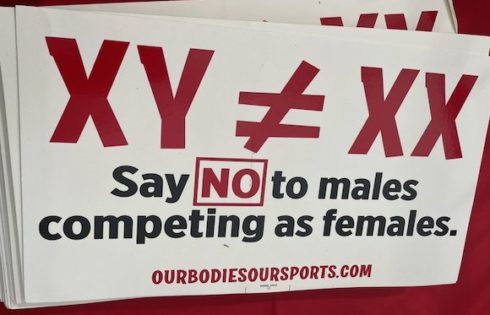
OPINION: When a mere accusation of ‘hate’ was leveled, they decided voting for me was a non-option
The student government denied me an open spot this year because of a school newspaper op-ed I wrote as a freshman that my campus seemed to willfully misunderstand.
My op-ed, published in 2021 in The Daily Orange, the Syracuse student newspaper, was about the “overt sexualization” of the campus in general. I concluded calling for “mak[ing] intimacy intimate again.”
The false impression that the piece was “homophobic” came from a few lines in the piece in which I pointed to a drag show as just one example among many of Syracuse’s hyper-sexual culture.
“The show involved nudity, routines, music and dialogue that wouldn’t be out of place at a strip club,” I wrote.
That was more than two years ago.
In September, I applied to join the Supreme Court of the Student Association. The Supreme Court had, and still has at the time of writing, multiple open seats.
I am chairman of the College Republicans at Syracuse, so I knew going in it would be an uphill battle. But that’s par for the course as a conservative on campus.
The process to join the court has two parts. The first is a nomination process by the court itself. When I first applied through the regular channels, which are run by the association’s executive branch, I never received a response. I was not offered an interview, nor was I notified of a rejection.
This puzzled me, as I knew multiple seats were open. I contacted the head justice of the court directly for an interview, to which he agreed. Why my application was originally ignored remains a mystery. After the interview, the court nominated me to join them, regardless of my political disagreements with some.
As an aspiring student with a deep interest in constitutional law and extra-curricular litigation experience, they thought I was qualified.
On the day of my confirmation hearing, I had very little opportunity to make my case. After my one-minute speech outlining my experience with teamwork and the law, emphasizing my belief in a non-political court, I waited for questions. Aside from one planned question about teamwork from a court judge, no one asked me anything.
I was asked to wait outside the room for deliberations. When I returned, I knew the result before anyone said anything: I’d been denied.
I was later told by an acquaintance who was in the room that a few students mentioned my freshman op-ed. They labeled it “homophobic” and claimed they doubted my ability to be objective.
They had not asked me about this topic while I was on stage; it was discussed only after I had left. I was given no opportunity to defend myself.
I was also informed that while a few students voted to deny my confirmation, the vast majority had abstained from voting at all.
In my Daily Orange op-ed, I had attempted to address and preempt accusations of homophobia like these.
“Because many people think condemning lewd drag is a criticism of the LGBTQ community overall, which of course is political and social suicide, they avoid judging such activities at all,” I wrote, clearly stating lewdness is not inherent to being a LGBTQ+ individual.
From there, I went further, expressing my concern for how the event may have perpetuated what I believe to be a false and harmful stereotype. “While the show may have felt empowering for individuals on stage, it plays into various stereotypes and can further alienate the LGBTQ community,” I wrote.
Despite all these qualifications, The Daily Orange labeled the piece “hateful” after publishing it and removed my byline.
I received a fair number of vitriolic messages and was blacklisted from ever writing for the school paper again.
So why the misunderstanding? And why the denial? My best guess is that it was not an outright inability to understand my point. Rather, it was an unwillingness to understand, a refusal fostered by a culture of cowardice.
I imagine that most of those in the assembly, especially those who abstained, had not read the article. But when the mere accusation of “homophobia” or “hate” was leveled, they decided voting for me was a non-option.
And this is not really about me. While the denial stung slightly, what it indicates about campus culture, which is already becoming popular culture, is far more troubling,
People are too afraid to say what they think. Most are too afraid to address nuance if it even appears to cut against social orthodoxy. Many are too afraid to even ask for evidence or clarification if the skepticism is directed at the party line.
A fear of speaking up, of saying what you believe, and of supporting the truth is what kills liberties and, ultimately, societies. The consequences of giving into it are infinitely worse than whatever perceived consequences of telling the truth may be.
This culture of fear has to end.
MORE: Don’t wage war against Russian scholars
IMAGE: John Parker
Like The College Fix on Facebook / Follow us on Twitter






Please join the conversation about our stories on Facebook, Twitter, Instagram, Reddit, MeWe, Rumble, Gab, Minds and Gettr.